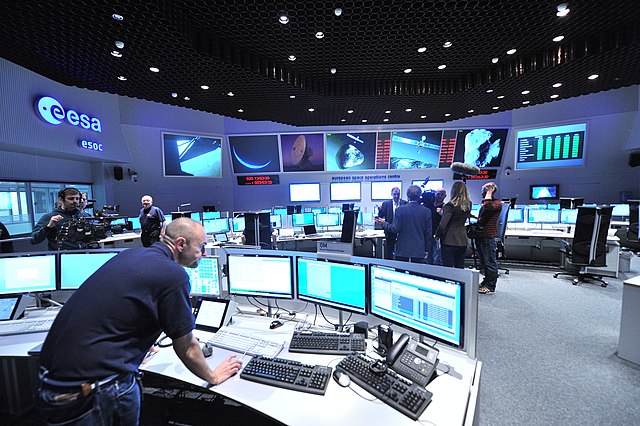by Adrian Glaz
Space debris are becoming a major problem for satellites and spacecrafts and there is a lack of regulation to address this issue. The EU, as a responsible space power, should use its strength and form a coalition of the willing aimed at adopting regulation to decrease the amount of debris in space, along with building technologies which produce less waste.
In 2009, an inactive Russian satellite collided with the active American satellite Iridium 33. Both were destroyed and the collision created almost 2.000 pieces of additional debris, now floating in the cosmos and endangering everything flying around the Earth’s orbit. This has been a wake-up call for the space agencies and has showed us what is to come. As a result of decades of space exploration and use, a rapidly growing number of spacecrafts are flying around the Earth, the majority of which have been inactive for years. They are becoming a growing concern, encapsulated in the so-called ‘Kessler syndrome’. An increasing number of objects in orbit leads to an increasing probability of collisions, which in turn is expected to lead to cascades of other collisions that may endanger all active spacecrafts. As a result, crewed and uncrewed space exploration might become impossible altogether. There is a lack of international regulation against space debris and many stakeholders fail to take action to mitigate the problem. The EU, however, has the power and reputation to initiate and facilitate concerted global action among space powers to create regulation in that field.
Limiting the increase in destroyed space technology is not in the interest of space powers like the US, China, Russia or the EU. All of them send a large number of spacecrafts into space, such as satellites and rockets, for space exploration, earth observation, military and security objectives, as well as telecommunications which is especially critical in today’s interconnected world. The EU itself, through the European Space Agency (ESA), has several projects, like Galileo or Copernicus, which provide geolocation alternatives to GPS and observe the Earth providing helpful information about the environment or transport. The ESA is “dedicated to the peaceful exploration and use of space for the benefit of humankind” and to “promot[ing] economic growth in Europe”. There are dozens of European satellites operating as part of these programs. Through the creation of a new EU agency in Prague in 2021, the EU has showned that it is planning to increase its space activities in the future. Space exploration is not the privilege of sovereign states and regional organizations like the EU; private space companies like SpaceX also contribute to making the Earth’s orbit busier, with Elon Musk’s company planning to have no less than 42,000 internet-providing Starlinks in orbit.
However, despite obvious risks, space stakeholders have not yet adopted enforceable regulation on space junk. While there are some international bodies at the UN level in charge of space cooperation, like the “Office of Outer Space Affairs” or the “Interagency Space Debris Coordination Committee” (ISDC), they have never adopted more than voluntary guidelines. The major document in this areas is the ISDC-published Space Debris Mitigation Guidelines from 2002. All existing guidelines are about mitigating the amount of new space debris created by new satellites or spacecrafts going into space. However, there is no mention of the other key instrument against space debris: the active removal of what is already in space.
Space debris mitigation can be achieved through various means. One way is to intentionally reposition the technology when the mission comes to a close, for instance aiming it into the Earth’s atmosphere where it gets destroyed, or move it far away from the planet. Another way might include the intentional depletion of all energy resources of the spacecraft, like fuel or batteries, to prevent explosions which would otherwise torpedo the debris around the orbit of the Earth.
Active space removal is the other and much more complicated available instrument, and it requires some creativity to succeed. The US startup Obruta, for example, has a plan to collect large amounts of debris through the use of inflatable nets. With a completely different approach, the French startup Share My Space identifies and predicts the movement of even the smallest pieces of debris through telescopic data and sends warnings to the operators of active spacecrafts which are in danger.
ESA itself commissioned “ClearSpace-1” for €100 million, as its first debris removal project planned for 2025, through which it will collect large pieces of dead equipment with a four-armed claw and push them into the Earth’s atmosphere. In addition, the ESA is currently in the process of drafting proposals for in-orbit surfacing, where spacecraft can be repaired or refueled while in orbit. That would decrease the number of new devices having to be shot up from Earth, a good solution for mitigation.
Most of these projects need satellites to operate and, for that purpose, dozens of missions have to be planned and large sums of money spent to make a difference. However, these project are very important, and the EU is already showing signs of acting as a responsible space power by going through different options and investing money in removing its own junk. “Space safety”, which includes debris removal, is one the pillars of ESA. Furthermore they have presented themselves as a responsible agency by signing the “Statement for a Responsible Space Sector” and by pledging a zero debris strategy through the removal of all satellites from valuable orbits after they cease operations by 2030. However, Europe should increase further its investments and projects to implement these commitments.
The EU is a regulatory powerhouse and knows how to export its standards to other countries. In addition, it has a reputation for being able to create broad coalitions of like-minded parties at the international level, like it did in the context of the Paris Climate Accords. The EU should therefore organise a movement for stronger standards and regulation of space debris.
As already mentioned, there are two ways at tackling space junk: mitigating future debris and the active removal of objects in space. Since guidelines for mitigation already exist, there should be more efforts to make them enforceable. Currently, countries can easily ignore these guidelines, but the EU could try and influence the space powers so that enforceable standards are codified internationally, preferably with clear and effective control mechanisms. When it comes to the more expensive active debris removal, it would be advisable to create a fund to collect money from the major space powers (as well as any other country which uses the satellites), so that the financial burden can be shared. Countries would focus on their own debris while projects can be financed to tackle the most demanding issues in locations where there is a lot of junk. The IADC can be used as a coordinating institution for that purpose, since all the major space agencies are already members.
Space debris is a major problem already, and will only become worse in the next decades. There is a lot to be done as current regulations are limited. The EU should step up its game by increasing its investment in mitigation and debris removal, and also perhaps more importantly by working closely with other major space actors. One can find similarities with global negotiations on the climate crisis, and there, the EU has proved willing and able to form a broad coalition of the willing through diplomatic means. Space should be the EU’s next area for international cooperation.
Adrian Glaz is an Erasmus+ student from Germany, studying International Relations and Development Policy at the University of Duisburg-Essen.





